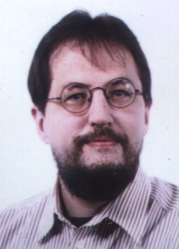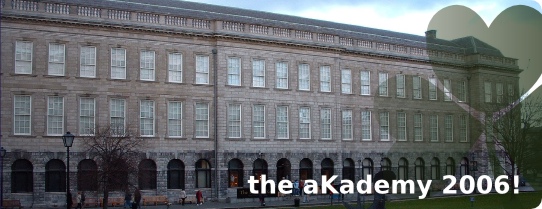Debian-Edu/Skolelinux - KDE in the Tough School Environment
- 2006-09-25
Dates: September 23rd to 30th 2006, Dublin, IrelandDebian-Edu/Skolelinux is the international Debian distribution for schools. With only 4 questions it installs a whole school server with a bunch of services like Linux and Samba file-server, webserver, mail server, LDAP server, DNS server, LTSP, … It can handle Linux thin- and fat-clients out of the box.
The main work of the Debian-Edu/Skolelinux developers is done concentrated on the technical side of the project. Auto-partitioning, network discovery and auto-connection of workstations and thin-clients to central file shares and the user database are the backbone of this ease of use.
With the growth of the project in 2005 and 2006, new members, new communities and new countries came together deploying Debian-Edu/Skolelinux to their local schools and their local culture. The KDE is their pre-configured desktop, the local teams are very proud to present a desktop in their native language.
As a high contrast to delightful technical solutions in the background, the default installed KDE of Debian-Edu/Skolelinux 2.0 looks rather boring. The philosophy from Norway seems to be, that every school can easily configure its own idea of desired desktop. The problem of this concept is the lack of local know how, because KDE by itself is getting complex to configure.
One of the solutions came from the French team, that pre-configured the KDE desktop for their schools. The result was not only one desktop, it was three desktops for different educational levels. Two of them are realized with KDE and a pre-configured Kiosk tool.
The speech will show the new shift of Debian-Edu/Skolelinux towards the desktop and the importance of being able to pre-configure such a desktop. With examples from France and (if available) from Germany the different solutions for educational level desktops will be shown. Another topic will try to demonstrate the desktop requirements to konquer the everyday school. The last point will present the KDE maintenance on the Debian-Edu/ Skolelinux server side.
Debian-Edu/ Skolelinux
a) Debian-Edu goes Desktop
b) Though School Environment
c) Educaditional Levels
d) Pre-configurable Desktops
e) KDE Requirements for schools
e) KDE Requirements for schools 2
f) KDE Maintanance
endChristian Külker

Christian Kuelker joined the Skolelinux project as an IT freelancer in 2004. His main tasks in the project are “The New Member Process”, the BOA (board of applications) and the development of the new user administration tool in Germany.
He travels through Germany as a developer and promoter of Skolelinux and takes part at gatherings in Germany, France and Spain. He also organizes events in the German test-center of Skolelinux.
Christian Kuelker is a student of sociology at the University of Bielefeld and teaches Japanese.
About KDEAcademy 2006

aKademy is the annual meeting of the KDE community. This year it will be held at Trinity College Dublin, Ireland. The event will span nine days and includes an exciting program of talks and presentations by outstanding KDE developers, joint development, bug-fixing & coding sessions, workshops for all KDE contributors, and design, usability and polishing work. Sponsors
aKademy will be opened by the two-day KDE Contributors Conference, followed by the general assembly of the KDE e.V. and an intensive week of developing, discussing and meeting people.
aKademy 2006 will be focused on:
KDE 4. KDE’s upcoming major release, KDE 4, is under heavy development. aKademy provides the opportunity to get together in person to discuss and hack on the core technologies of the next generation desktop. To show the results achieved at aKademy there will be a technical preview release directly after the event.
Desktop Standards and Cross-Project Collaboration. The KDE project is highly committed to open standards and cross-project collaboration. At aKademy there will be presentations, discussions and coding in relation to this topic. We are happy to welcome members of other desktop-related communities to take part in creating a common free desktop platform.
Meeting the Community. As the biggest KDE community event, aKademy is a great place for meeting the people who make your favourite desktop. If you are already part of the community and want to meet old friends, if you are a newcomer and want to get in contact with the people you only knew by email before or if you are from an organization interested in KDE and would like to know who are the people behind this project, come to this year’s aKademy.
In short, if you want to take part in shaping the future of the free desktop, aKademy 2006 is the place to be.
Participate
aKademy is of interest to
All active KDE contributors: Programmers, artists, documentation writers, translators, usability experts, promoters and all other supporters.
Members of Related Projects: Members of other desktop-related projects, standardization efforts or organizations working with KDE are welcome to join the event and contribute their part of the future desktop.
Industry Partners: ISVs interested in improving KDE integration, companies who have migrated or are considering migrating to KDE, partners engaged in projects to enhance the Free Desktop, and those who are interested in learning how the future KDE will provide an even better integrated enterprise solution.
Other Interested Parties: People or organizations interested in how KDE works, what is planned for the future, and those interested in getting to know the people behind the desktop have a great opportunity at aKademy to meet, discuss, share ideas and more.
=> http://akademy2006.kde.org/
- Last modified: 2006-09-25
- 889 words